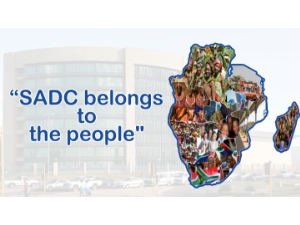“SADC BELONGS TO THE PEOPLE”
The aspirations of citizens in southern Africa are clearly spelt out in the Regional Indicative Strategic Development Plan (RISDP) 2020-2030. These ambitions are “a peaceful, inclusive, middle to high income industrialized region, where all citizens enjoy sustainable economic well-being, justice and freedom.”
While significant progress has been made in achieving the goals, the Southern African Development Community (SADC) can accomplish more if systematic measures are put in place to formalize and promote robust engagement between governments and Non-State Actors (NSAs).
Effective engagement between the government and NSAs is critical because developmental processes such as implementing the SADC RISDP 2020-20230 are not the responsibility of governments alone — but also require the involvement of other stakeholders, primarily NSAs. For example, NSAs can ensure social accountability in the roll-out of the RISDP 2020-2030.
The SADC RISDP 2020-2030 is a regional roadmap that prioritizes the integration issues of infrastructure development, industrial development and market integration, social and human capital development and other crosscutting issues, including environment, climate change, disaster risk management, gender and youth empowerment.
In this regard, the 3rd regional RISDP NSA Dialogue which opened today, 13 September 2023 in a hybrid format coordinated from Johannesburg, South Africa until 14 September 2023 will among other things assess progress made by southern Africa in implementing the 10-year regional strategic plan.
The dialogue, which will also convene parallel national hybrid gatherings across five other different locations namely Dodoma, Tanzania; Harare, Zimbabwe; Lilongwe, Malawi; Lusaka, Zimbabwe; and Maputo, Mozambique will explore ways of strengthening SADC-led NSA engagement mechanisms in a bid to push for accountability across southern Africa since SADC belongs to all its citizens.
While the RISDP 2020-2030 recognizes the importance of government partnerships with NSAs to ensure the successful implementation of regional policies and programmes, there have been few formal opportunities for NSAs to inform or monitor SADC processes at either the national or regional levels. Furthermore, multi-stakeholder SADC National Committees (SNCs) continue to be non-existent or non-functional in most member states, hindering collaboration between governments and NSAs.
“Co-convened by 14 regionally focused organizations, the event will focus on the importance of socially accountable public resource management in the region’s development,” reads part of a press statement released ahead of the Dialogue. The theme of this year´s Dialogue is “Accelerating SADC’s Development through the Socially Accountable Generation and Use of Public Resources.”
“Participants will review how SADC Member States have worked toward strengthening accountability in the generation and management of public resources to ensure the delivery of effective public services. The dialogue will also focus on identifying progress and challenges in the key social sectors of health, education, and agricultural sectors; assess regional actions supportive of women and young people; and interrogate the generation of resources for development through industrialization and trade,” the statement reads.
Another critical area for discussion at the Dialogue is how the region is responding to the growing impact of climate change on development. Southern Africa like the rest of the continent has been experiencing an increased frequency and severity of floods and droughts in recent years due to climate change variability, thus the need to come up with innovative ways to mitigate the impact of climate.
Various stakeholders including regional and national civil society organizations, smallholder farmers associations, private sector associations, the media, SADC Secretariat, SADC National Contact Points and National Committees and the SADC Parliamentary Forum are expected to attend the meeting. At the end of the meeting, the Dialogue will provide recommendations on advancing the implementation of the RISDP’s regional and national plans.
The first RISDP NSA Dialogue was held in June 2021 and focused on raising awareness about the commitments contained in the RISDP and its draft Implementation Plan. The second Dialogue took place in September 2022, and highlighted the importance of socially accountable public resource management in SADC’s development.
The dialogue is convened by Southern Africa Trust, Economic Justice Network (EJN) of the Fellowship of Christian Councils in Southern Africa (FOCCISA), Southern African People’s Solidarity Network (SAPSN), and the Southern Africa Coordination Council (SATUCC).
Other partners are the SADC Council of NGOs, Care International, Global Campaign for Education, Trust Africa, SADC Youth Forum (SAYoF), Agenda 2063 Media Network, and the Partnership for Social Accountability (PSA) Alliance (a consortium of ActionAid International (AAI), Public Service Accountability Monitor (PSAM) of Rhodes University, Eastern and Southern Africa Small Scale Farmers’ Forum (ESAFF) as well as SAfAIDS.























